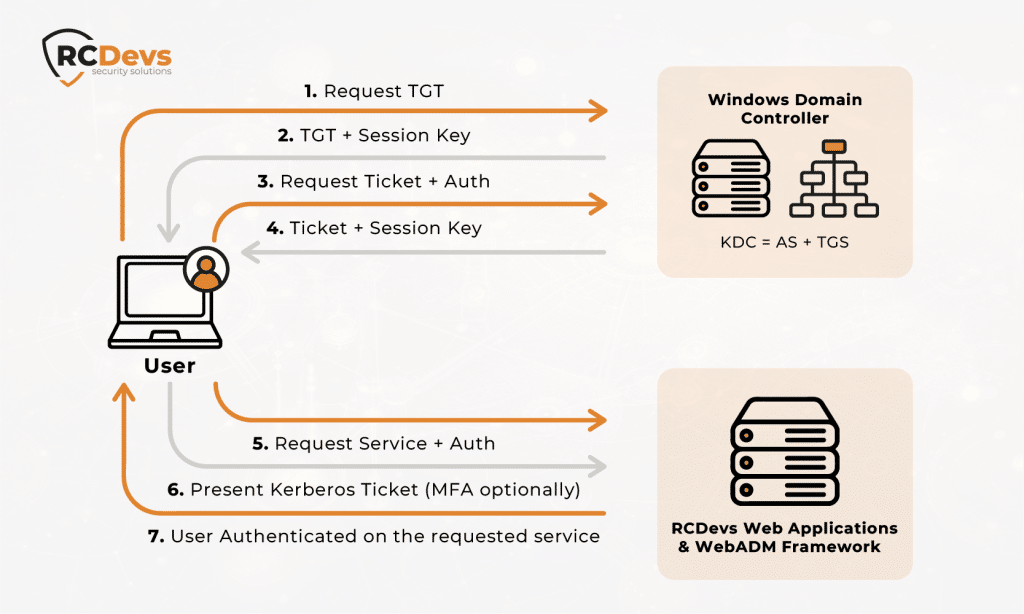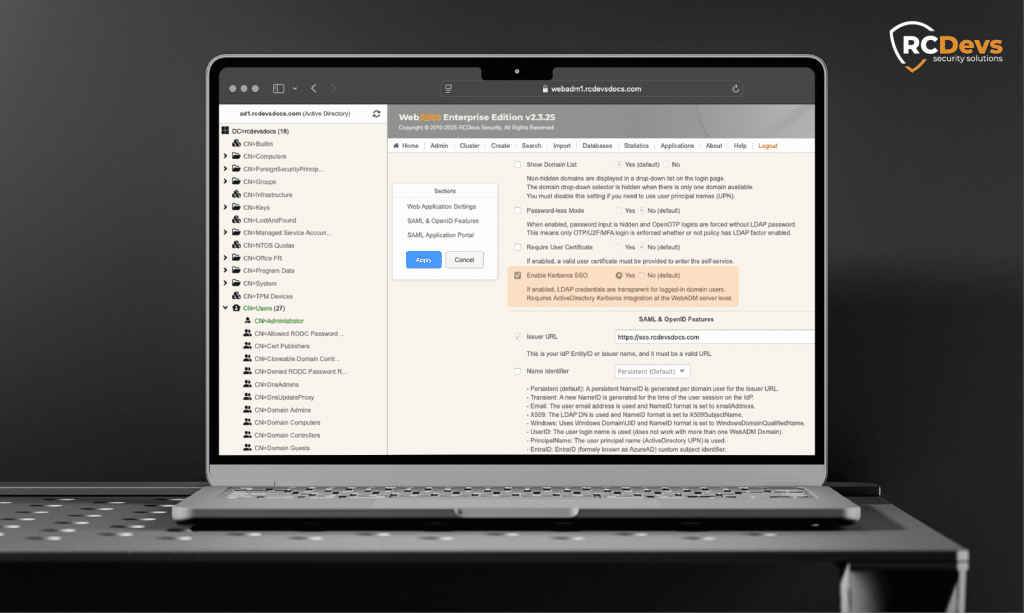
Enhancing Compatibility: Kerberos Support in OpenOTP
Enhancing Compatibility: Kerberos Support in OpenOTP
Kerberos remains a cornerstone authentication protocol for organizations operating on-premises Active Directory (AD) environments. While modern protocols like SAML, OpenID, and OAuth dominate cloud-based identity and access management (IAM), Kerberos continues to play a vital role in legacy and hybrid IT infrastructures. Recognizing this, RCDevs has added Kerberos compatibility to its suite of IAM solutions, ensuring that even traditional setups can benefit from the advanced security features of OpenOTP.
How RCDevs Enhances Kerberos with OpenOTP
With Kerberos compatibility in OpenOTP, organizations gain the ability to integrate strong, modern authentication methods into their legacy systems. Here’s how it works:
- Transparent MFA: When a user logs in, Kerberos seamlessly communicates with OpenOTP to determine if MFA is required. If so, OpenOTP handles the multi-factor challenge without requiring the user to re-enter credentials.
- Simplified configuration: Deploying Kerberos support in RCDevs solutions is straightforward—a single configuration file added to WebADM activates this feature.
- Backward compatibility: OpenOTP bridges the gap between legacy systems and modern security needs, ensuring that organizations can continue using Kerberos while benefiting from advanced IAM capabilities.

Benefits for Your Organization
Adding Kerberos compatibility to OpenOTP provides several key advantages:
- Streamlined user experience: MFA becomes a natural extension of the login process, with no interruptions or additional steps for end-users.
- Enhanced security for legacy environments: Even older protocols like Kerberos can be fortified with modern security layers through RCDevs’ solutions.
- Support for hybrid IT: Organizations transitioning to the cloud can continue to leverage their existing AD infrastructure while gradually adopting newer protocols like SAML and OpenID.
Simple Deployment Process
Setting up Kerberos in RCDevs’ solutions is designed to be quick and easy:
- Access the Kerberos configuration documentation.
- Add a single configuration file in WebADM.
- Enjoy seamless, secure authentication for your AD domain.
A Brief History and Technical Overview of Kerberos
Kerberos was developed in the 1980s at the Massachusetts Institute of Technology (MIT) as part of the Athena Project. Its name, derived from the three-headed dog in Greek mythology, symbolizes its three key components: the client, the Key Distribution Center (KDC), and the service server. Kerberos uses symmetric key cryptography and a ticket-based system to authenticate users securely without transmitting passwords over the network. Key technical highlights:
- Ticket-based authentication: Kerberos operates using tickets issued by the KDC, which verify a user’s identity and allow access to services.
- Time-sensitive security: Tickets have expiration times, reducing the risk of replay attacks.
- Integration with AD: Microsoft adopted Kerberos as the default authentication protocol for Active Directory, ensuring its widespread use in enterprise environments.
Despite being over 30 years old, Kerberos remains relevant due to its efficiency and deep integration with critical IT infrastructure.

Why Kerberos Still Matters
Kerberos was introduced decades ago as a secure, efficient Single Sign-On (SSO) protocol, and it has since become deeply embedded in Microsoft’s Active Directory architecture. Here’s why Kerberos compatibility remains relevant:
- Seamless SSO for AD environments: Users log in once and gain access to multiple resources, such as shared drives and applications, without needing to re-authenticate.
- Transparent MFA integration: OpenOTP enhances Kerberos with transparent MFA, ensuring security without disrupting the user experience.
- Stability and reliability: For organizations with legacy systems, Kerberos provides a stable foundation for authentication workflows.
Why RCDevs?
RCDevs specializes in providing powerful IAM solutions that are adaptable to both modern and legacy environments. By integrating Kerberos support, we demonstrate our commitment to helping organizations bridge the gap between established IT infrastructures and cutting-edge security requirements.
Discover how RCDevs can enhance your existing infrastructure while paving the way for a secure, efficient future. Contact us or visit our website to learn more.

